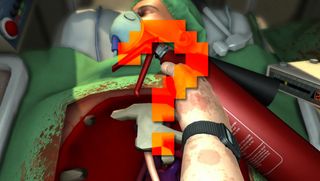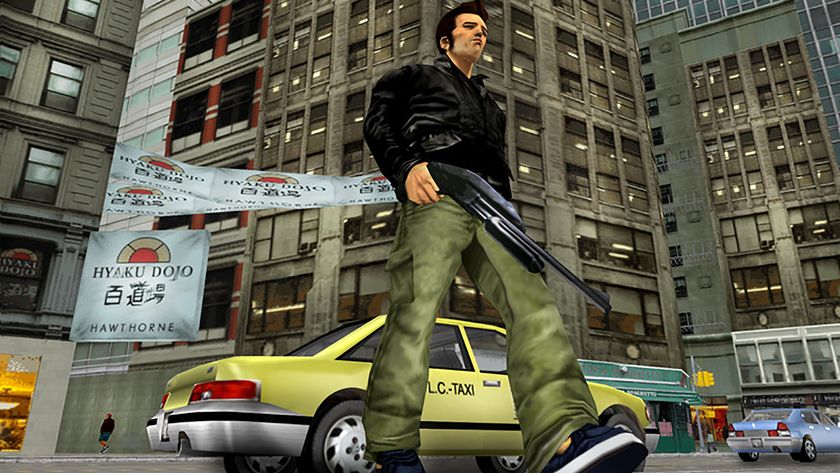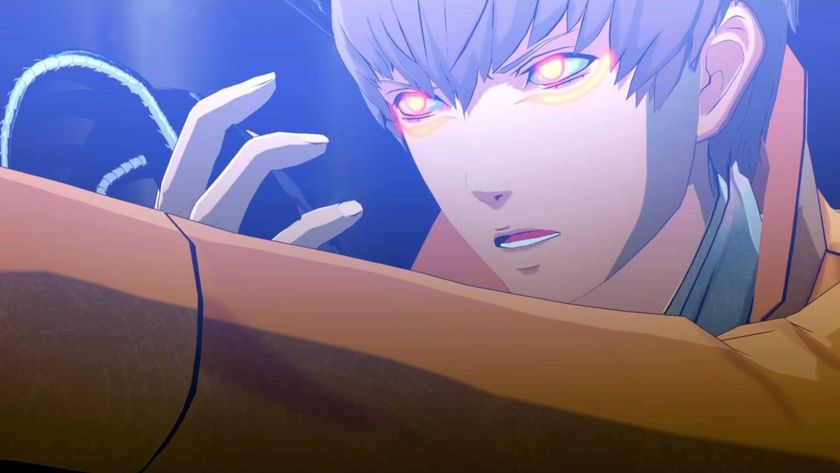Top 7... Lies games tell us about medicine (and staying alive)
Malpractice is the new hot thing

Paging Dr. Noob
Medicine is hard. Its always disappointing to find that your Fruit Ninja skills dont translate to precise surgical tactics like youd want them to. Its also not as exciting as video games will have you believe. Every situation is basically life or death, so healing needs to be fun and exciting, and therefore medical misinformation has been stretched to an impressive degree. Yet we let it slide. Dying? Cool, heres a shot of something, now get back in there you! But even with our impressive ability to suspend disbelief, sometimes we see a protagonist cauterize him/herself and then promptly get reamed by a pole, and we always have to wonder, Are they ok?
Weve already talked about the totally unrealistic things games do all the time, but this week were sitting down with real, live nurses to understand just how their livelihood is misrepresented in video games.

7. Defibrillation doesn't raise the dead
This one? It's all wrong. Like, at a basic level, defibrillators do not do what you think they do. And its silly, because if you just knew Latin like the entire staff of GR does, youd find that their use is literally in the name. In video games (were looking at you Battlefield), defibrillators are used for resuscitation, bringing fallen comrades back from a flatline and certain death. But shockingly (HA!) defibrillators do no such thing. They--wait for it--defibrillate someone.
Looking at the image above, fibrillation is the one that looks like a seismograph recording a sumo match, and occurs when the heart gets out of rhythm and cant fix itself. The defibrillators job is to go in and reset a still-beating heart. Think of a computer: you can only reset it when its on, right? If the person is already dead, youre just killing them more. Sorry, Battlefield 3 players--you're just sending an electric shock through a bloody corpse. Oh, and as a side note: resuscitation from a flat line only has about a 5-10% success rate to begin with. So thats sad.

6. Internal bleeding should've killed nearly every video game hero by now
The true silent killer. Your hero, after surviving hordes of injustices and hours of struggle, arrives at the front steps of the man who murdered his father and just dies. Turns out, that roundhouse to the gut at the beginning of that game really did a number on his spleen. It may sound obvious, but bleeding is bleeding; internally, externally, it doesnt matter. When its not in your veins, its not helping. If the new Tomb Raider had abided by this rule, poor Lara Croft wouldnt have survived through a fifth of her game (which would've been a shame, because it was a really good game).
Remember that terrifying moment in F.E.A.R. when you round that corner and WHAM, the cannibal dude lays you flat? Getting knocked out, in real life, is incredibly dangerous. Blood seeping into the brain leads to brain damage and ultimately brain death. Our protagonist really should've gotten himself checked out, as our resident nurse tells us he was at high risk of an intracranial hematoma (duh). And don't even get us started on fighting games.

5. You're going to die if you're not near a doctor and you're impaled by something
No! Dont do it, Joel! Dont pull that thingy out of your stomach! Don't d--oh, you did it. Ah, man, youre so dead. Unfortunately for The Last of Us' Joel and every other punctured video game character (again, we're going to have to reference Tomb Raider's shoddy science here--Lara gets run through with rebar some twelve seconds into the game), if you get impaled by almost anything its probably game over for you. And irrespective of whether youre of the pull it out or leave it in camp, unless youre in a sterile environment with a doctor, both decisions are poor ones.
The two main issues: exit nicks and tetanus. If the projectile hasnt hit a major artery upon entry, even if youre incredibly careful, youll likely hit something new and bad on the way out. Heck, thats one of the main beauties of the design of the arrowhead (and porcupine quills, cactus needles, and bee/wasp/scorpion stingers). Plus, if a doc isnt on hand with a way to flush the wound as soon as the pokey thing is taken out, then youll more than likely get tetanus. It doesnt just come from rusty metal, and if youve ever seen the symptoms youll thank you moms for taking you to get that awful shot every school year.

4. You've been lied to about tourniquets your whole life
First off, the thing you think is a tourniquet? It isn't a tourniquet. You can't just grab a rag and tie it around your arm and go, "Check out my tourniquet!" A real tourniquet comes with a twist that you wrench until the band completely cuts off blood flow (just look it up). The thing that video game characters do when they look badass and self-apply by MacGyver-ing a tourniquet from a torn shirt using their teeth and free limb, is... just not even a thing.
And Lara, girl, we're sorry to keep harping on this, but you need to undo that arm bandage you call a tourniquet right freaking now. Or at least change it--while the initial bandage might've been useful when the wound was new and bleeding, after the initial blood clot a tourniquet actually reverses in effectiveness. The primary use of this triage tool in the actual medical field is for short and emergency stoppages of blood flow to a limb of the body, usually in limb loss or surgery. The tourniquet goes on, the limb begins to die from no nutrition flowing in, the medicine gets did, and the tourniquet comes off. The longer its on, the worse things get.

3. Talking while dying isn't really going to sound very graceful
Dying last words are crucial to so many relationships in video games. Father-son, mentor-mentee, leader-protagonist, assassin-templar--for some reason, everyone waits until those final seconds to dish out that beautiful wisdom. Theres only one problem its usually never that pretty. The nurses we talked to identified Cheyne-Stokes breathing as the culprit. See, when the body is shutting down, it puts everything it has into sucking in those last few breaths of air. The nurse we spoke to referred to it as violent and tornadic noises coming from the lungs. No room for quiet moments of reflection, no soliloquies, no whispers in the ear.
Take every villian from Assassins Creed or any Tales Of game. Wed be missing so much if all we had were soft gurgles instead of poignant words! But alas, soft gurgles it is.

2. Your amnesiac hero is more likely to forget the future than the past
Ah, the clean slate approach to storytelling in games. Want to add mystery to your JRPG? Just make the main character forget everything! And its so convenient how that happens: they forget seemingly crucial details but wonderfully remember how to talk, walk, breathe, and (most importantly) everything after the amnesia event. It's good for story, though--what else gives you an excuse to have mentors teach the main character about the basic elements of the world? It's the easiest way to shoehorn in exposition, like ever. Shame it doesn't really happen like that.
See, there are two different types of amnesia: retrograde (before) and anterograde (after). An incorrect form of retrograde amnesia is what our heroes get--forgetting everything except convenient plot elements. There are few cases of that--usually someone just forgets a traumatic event, or a few weeks of time, not everything. Anterograde is actually a much more common form, and is characterized by the person unable to remember things from the amnesia event onwards. That wouldn't make for very fun gameplay, would it?

1. If you're badly wounded, you'll never get completely better
From bruises to broken arms to cuts, full recoveries are a myth. And dont even get our nurse friends started on health bar recovery in battle--video game characters recovering from incredibly traumatic events is bad enough. Nobody comes out 100% from anything that affects the body. You always have phantom pains, you always favor the other hand from the months of recovery that forced you to use it, and your injuries are always in danger of ripping/tearing/flaring up/compounding/intensifying at any given moment.
When one of our interviewees was told about some of the miraculous recoveries characters have in games like The Last of Us, she just laughed and started one-upping it with a story about this one time she broke a mans femur in half. We didn't really know how that's related--so we quickly changed the subject before getting too nauseous, her laughing still ringing in our ears. Nurses are hard as shit. Real life.

In The End
We just decided to blame the human body. It really sucks at delivering those climactic recoveries. It might be a good thing that video games casually trounce realism--generally there are no complaints, and games are actually better for them. Any other medical mishaps that furrow your brows? Let us know in the comments! Also a special thank you to our fantastic nurse friends for their great (and sometimes unsettling) information.
And if you're looking for more, check out 10 Lies Video Games Tell Us About War and 10 Lies Video Games Tell Us About Women.
Zach was once an Associate Editor for Future, but has since moved into games development. He's worked at EA and Sledgehammer Games, but is now Narrative Director on League of Legends and Valorant at Riot Games.













